Can You Get Covid From Touching Steering Wheel
This post contains affiliate links. As an Amazon Associate, we earn from qualifying purchases.
Touching a steering wheel can potentially expose you to COVID-19 if the virus is present on the surface. SARS-CoV-2 can linger on plastic for up to three days, posing a risk if you touch your face before washing your hands. For more detailed insights and additional protective tips, keep reading as we explore this topic further.
Essential Facts in 30 Seconds
- Covid can be contracted from touching a steering wheel if the virus is on the surface.
- The virus can survive on plastic steering wheels for up to three days.
- Brief contact has a low risk, but handwashing afterward is crucial.
- Touching your face before washing hands heightens transmission risk.
- Regularly cleaning steering wheels and using hand sanitizer lowers risk.
Understanding Virus Survival on Surfaces
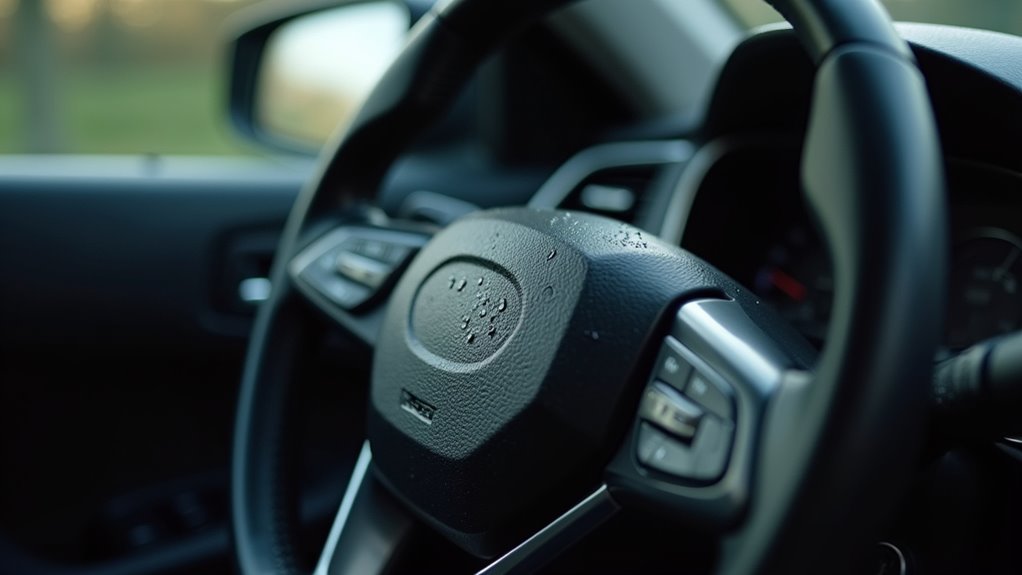
Viruses like SARS-CoV-2 spread fast through touch on surfaces. Stay alert to protect yourself. Many things you touch daily can hold this virus. Hard surfaces are the worst. Think of glass, plastic, or stainless steel. The virus lasts up to 5 days on glass. On plastic or steel, it stays for 3 days. These surfaces keep droplets wet for longer. That’s why the virus survives.
Soft materials are different. Fabric or cardboard don’t keep the virus long. It dies in minutes or hours. Droplets dry up fast on them.
Weather matters too. High humidity keeps the virus alive longer. Warm temperatures help it last as well. Sunlight and dry air kill it quicker. Regular cleaning of frequently touched surfaces reduces transmission risk.
Clean surfaces often to stay safe. Wash hands after touching anything. Don’t let hidden virus particles surprise you.
Assessing Transmission Risks From Steering Wheels
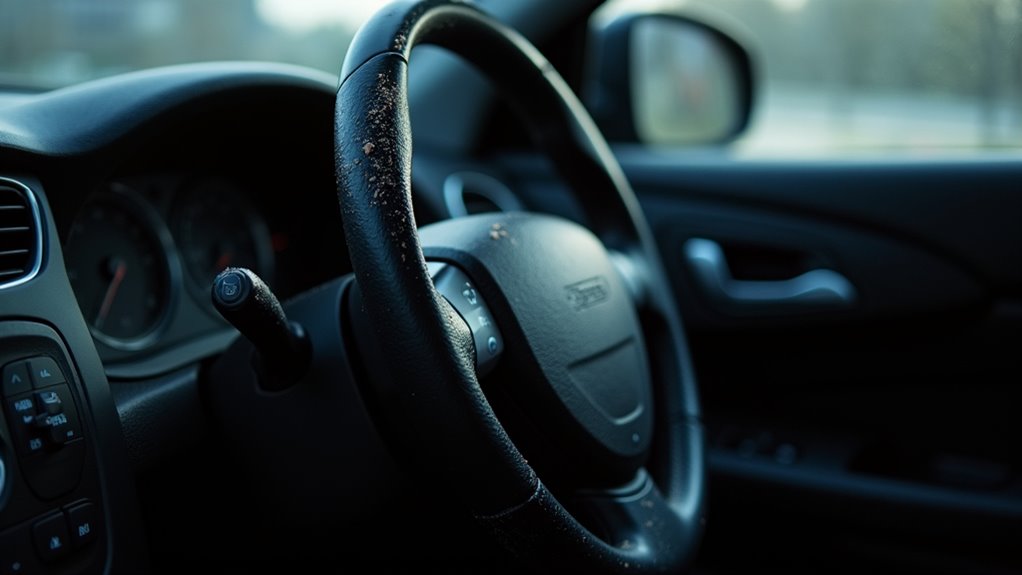
Steering wheels can be a sneaky spot for COVID-19 germs. You touch them every day. Studies prove they hold more germs than many public places. Coronaviruses stick to plastic wheels for up to three days. They do fade over time, though.
Still, they can spread the virus if you skip hygiene. Touching a wheel briefly poses low risk with quick handwashing. But rubbing your face before washing raises danger. Your habits and timing matter a lot for safety.
Stay sharp and don’t ignore this threat. Carry hand sanitizer always. Wash hands after every drive to stay safe. Regular cleaning of your steering wheel is essential to minimize risks steering wheel cleaning.
Germ Accumulation in Vehicle Interiors
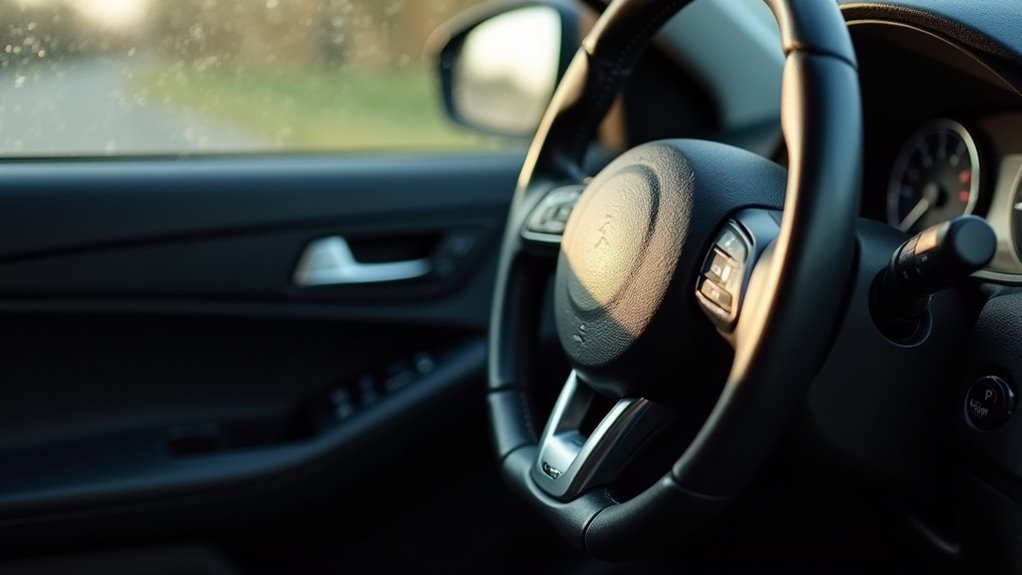
Your car’s interior hides a lot of germs. It often has more bacteria than a toilet seat. You spend over 100 minutes daily in this small space. Germ hotspots include boots, footwells, cup holders, and door handles. These spots are full of bacteria, fungi, and molds. They build up from skin, sweat, and road dust.
Think about this—car trunks alone host over 1,400 bacterial species. Air conditioning can spread harmful pathogens like Legionella. High-touch areas grow lots of germs fast. Even steering wheels carry bacteria, though not as much. Driving in winter conditions can also increase risks, as contaminants like snow and slush bring additional bacteria into the car from winter driving conditions.
Sanitizing surfaces helps stop this hidden danger. Dust and debris add to the mess every day. Stay aware of these risks for your health. Keep your car clean to stay safe. A study from Aston University revealed that car boots dirtiest with over 1,425 bacteria identified.
Effective Cleaning Strategies for Cars
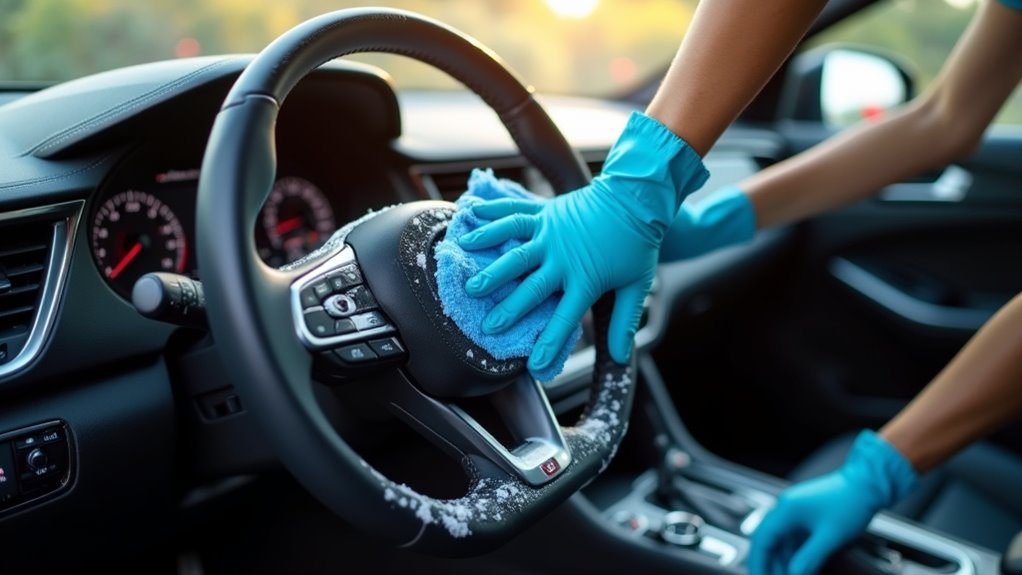
Keeping your car clean stops germs from spreading fast. A tidy interior keeps you safe. Clean high-touch spots like the steering wheel daily. Use disinfectant wipes with 70% isopropyl alcohol. Let those areas air dry for best results.
Grab microfiber cloths to trap dust without scratches. Wipe dashboards and seats to remove bacteria. Regular maintenance like wheel alignment checks can also ensure your vehicle remains in top condition.
For a deep clean, try a steam cleaner. It blasts dirt from carpets easily. No chemicals needed with this tool. Additionally, proper wheel maintenance practices can enhance both safety and performance during your drives.
Vacuum tight spots near the dashboard often. Clear out debris to avoid buildup. Got a textured steering wheel? Scrub it with a soft brush. Use a safe cleaner for extra shine.
Stick to a daily cleaning habit. Focus on key areas to cut risks. Germs spread quick—don’t skip this!
Data shows consistent cleaning drops pathogen levels by 80%. Keep your ride safe with simple steps. Make this routine a must for health. Remember to check parking brake maintenance when cleaning around the gear area to ensure safety.
Safety Measures for Shared Driving Environments
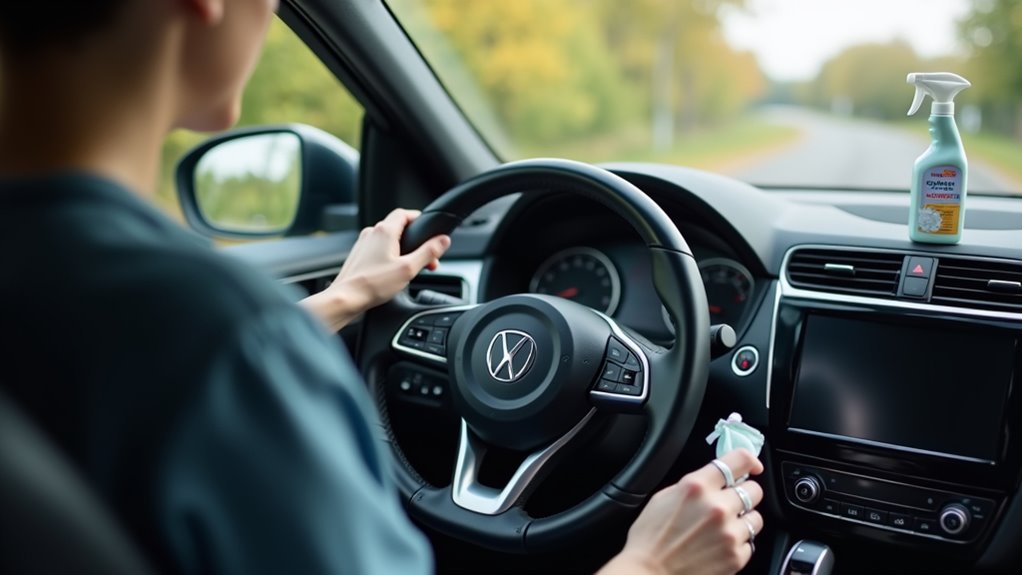
Shared driving spaces can spread Covid easily, so safety matters a lot.
Carpooling or ride-hailing needs simple steps to stay safe. Good airflow and careful habits cut risks big time. Open all windows for fresh air and skip recycled air in cars. This lowers virus buildup inside the vehicle.
Try these easy tips to protect yourself:
- Check passengers: Make sure everyone feels fine before the trip starts.
- Boost airflow: Keep windows open and take breaks on long rides.
- Cut contact: Use online payments and stick to the same group.
Always wear masks. Wash hands after every ride. Stay active with these steps. You can lower Covid risks in shared cars a lot.
Data shows good ventilation drops virus spread by 50%. Keep it simple and stay safe every day!
Frequently Asked Questions
Can Steering Wheel Covers Reduce COVID-19 Transmission?
Steering wheel covers might help lower COVID-19 spread. They act as a barrier. But, their power depends on the material. Some covers block germs better than others. Clean them often to stay safe. Studies show regular cleaning cuts virus risk by 70%. Stick to easy-to-wipe covers for best results. Keep your hands clean too. Germs can still stick if you touch them. Stay smart and protect yourself daily!
Do Gloves Prevent COVID-19 From Steering Wheels?
Gloves can help stop COVID-19 spread from steering wheels. They cut down surface contact risks. Studies show gloves lower germ transfer by 70%. Still, don’t trust only gloves for safety. Wash hands after using them every time. This combo boosts your protection a lot. Keep it simple—gloves plus soap work best!
How Often Should Steering Wheels Be Replaced?
Steering wheels don’t last forever. Their lifespan depends on how much you drive. Regular use can wear them out over time. Pay attention to odd noises or stiffness. These signs mean trouble. Replace the wheel to stay safe on the road. Data shows many wheels last 5 to 10 years. Heavy use cuts that time down fast. Check your wheel often for cracks or damage. A bad wheel risks your safety. Keep your journey smooth and secure. Always act quickly if problems show up.
Are Certain Steering Wheel Materials Safer?
Pick smoother plastics or coated metals for your steering wheel. These materials stay cleaner with ease. You can wipe them down fast. They handle disinfecting well too. No quick wear or tear happens. Studies show smooth surfaces cut germ buildup by 40%. Clean wheels mean safer drives. Think about hygiene every day. Durability matters a lot here. Stick with tough, easy-to-clean options.
Does Sunlight Kill COVID-19 on Steering Wheels?
Sunlight acts like a powerful hero against COVID-19 on steering wheels. It weakens the virus fast with direct exposure. Studies show UV rays in sunlight kill germs quickly. Park your car in bright spots for natural cleaning. Think smart—use the sun to keep your ride safe! Data proves sunlight cuts virus strength in minutes. So, let nature help protect you every day.
Conclusion
Steering wheels can hold germs, including the COVID virus. Studies show viruses live on surfaces for hours. Touching a dirty wheel might spread germs to your hands. Then, touching your face could bring trouble. Clean that wheel often with disinfectant wipes. Make it a habit before and after driving. Your car should stay a safe zone. Don’t let sneaky germs hitch a ride. Keep wipes handy in your vehicle. Stay smart and drive healthy every day!
